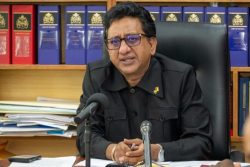In his address to Cuba’s National Assembly on August 1, Communist Party Secretary Raoul Castro struck a note of even greater urgency than he has in the past about the need for Cuba to embrace economic reforms. The language employed by the Cuban leader this time around must have shocked the party’s old guard, the primary target, it seemed, of his outpourings in the National Assembly.
In his address, Raoul Castro even appeared to concede his own tiredness with the dogma-encrusted ideology of state control that has driven the Cuban economy for more than half a century; at times, he openly lambasted the unyielding, doctrinaire mindset of his comrades in the party old guard whose condition, he asserted, appeared to render them ill-equipped to oversee the reforms that he continues to advocate. Raoul Castro, from his own vantage point, appears to recognize and, perhaps more significantly, to acknowledge that times have changed, that time and circumstances have caught up with Cuba. “The first decade of the twenty first century has already past,” he told the National Assembly.
Rather than rail against capitalism and private enterprise, as has been the custom in Cuba, Secretary Castro deliberately targeted the guardians of ideological purity, citing sloth, sluggishness and self-interest as some of the reasons for their reticence. He went further, warning of consequences for those who appear either unable or unwilling to hasten the pace of economic reform. “We must clear our heads of foolishness of all kinds,” is what Raoul Castro told the Cuban National Assembly.
It was the same in Gorbachev’s Soviet Union, with the pragmatism of a leader who had become aware of the realities of global transformation versus the unyielding adherence to an archaic doctrine by party hardliners who refused to acknowledge that transformation and who, moreover, had become complacent and comfortable in an ideological orthodoxy which, in many cases, worked to their considerable material benefit. Communism, as both the Soviet Union and Cuba, found out, is not immune to massive corruption. In the end the once all-powerful Communist Party lost control and the Soviet Union was swept by a tide of national weariness.
It is this, it seems, that Raoul Castro seeks to avert in Cuba. Havana would have followed every twist and turn in the tide of events that transformed the Soviet Union, and what Raoul Castro appeared to be saying to his comrades on August 1 was that failure to acknowledge the lessons of history could have dire consequences for the survival of Cuba’s Communist Party. There can hardly be a harsher irony; in pursuit of its own survival the world’s longest surviving communist regime looks to an economic ideology against which it has set its face for more than half a century.
There are understandable reasons for the leaden-footedness of Cuba’s hardliners. They would be more than a little apprehensive about the uncertainties of a market-driven economy in which the state is no longer weighed down by the burden of having to either conceal or subsidize inherent inefficiencies of communism’s economic model, and where the economic muscle of a strong private sector might even, some day, challenge the might of the Communist Party itself. Cuba’s communist old guard would also be pondering the thought that the ‘medicine’ for economic reforms could give rise to an unaccustomed public restlessness that might manifest itself in unwelcome and unwholesome ways. The comrades, after all, have grown used to the stable predictability of communism.
Perhaps the biggest challenge that Cuba faces in its reform process reposes in the potentially daunting outcomes of the paring hundreds of thousands of workers from the state payroll that reportedly carries around 90 per cent of the country’s work force; outcomes that will include overnight high unemployment and the attendant social ills that manifest themselves in even the most robust of free enterprise economies; crime, perhaps even higher levels of corruption and an assortment of various other problems including the creation of a large and perpetually brooding underclass that threatens the accustomed social order and which might even confront the regime itself.
Some reform measures that seek to help cushion the effects of high unemployment have already been implemented; including the creation of more space for small private enterprise ventures in sectors that are determined by the state and broader reforms designed to attract external investors. Whether through home-grown or foreign investment-driven reforms, however, a new economic direction will have to evolve over a period of time and there will be, from the standpoint of Cuba’s communist old guard, a worrying window of opportunity for a wider threat to the old order. Such a condition is likely to give rise to fears of support to any threat to the prevailing political system directly from the United States and from the external Cuban dissident community.
The Cuban leader, no doubt, is aware of some of the threats posed by the pursuit of economic reform. On the other hand Cuba would appear to have few options. As the Marxist scholar and author of the book Cuba: A revolution In Motion, Isac Saney said in a television interview last year, “Cuba exists in the real world. You have to be able to live within your means and the state sector itself can no longer carry people who are not involved in productive activities.” Raoul Castro, it appears, has come to terms with that reality.
If the choices are stark the portents may, perhaps, not be as disturbing as some of Secretary Castro’s comrades appear to feel. Market reforms may not necessarily mark the end of Cuba’s socialism or the demise of its Communist Party, which have outlasted ten United States presidents since the revolution in 1959. Cuba, for example, has declared its intention to maintain its highly impressive public health and education systems (though Cuba watchers have expressed the view that these would be hard-pressed to survive Cuba’s transformation to a market-driven economy) in an effort to cushion the predictable inequalities that will arise from market reforms. These so-called ‘jewels‘ of the Cuban revolution have won praise even from those institutions that are advocates of democracy, including the United Nations and the International Monetary Fund. “Cuba,” declared the then UN Secretary General Kofi Annan in 2000, “demonstrates how much nations can do with the resources they have if they focus on the right priorities – health, education, and literacy.” Market reforms or otherwise, Cuba still leads the developing world in terms of low infant mortality rates and high literacy rates. Cuba’s successful biotechnology industry reportedly earned the country around US$300 million last year. The country produces – and offers cheaply to Cubans – 83 per cent of its own pharmaceuticals, perhaps a literal life-saver, in the face of a sustained US economic embargo.
A market-driven economic model in Cuba, can for example, position it to challenge the monopoly of western drug companies in developing countries where, in some instances, good health is priced out of the reach of the poor. Here, there are distinct advantages to be derived for Cuba’s well-educated population, notably its doctors and other medical professionals who have already made an impact on the quality of medical services both at home, elsewhere in the hemisphere and further afield – except, of course, that Cuba’s ideological outlook has meant that it has not reaped the full economic benefits from its investments in a strong human resource base, preferring to have its medical personnel serve abroad as image-builders for the revolution while relying primarily on tourism, nickel mining and remittances from Cubans living abroad as the primary sources of foreign exchange earnings. Put differently, Cuba is no ‘basket-case.’ It possesses some of the basic infrastructure that could help drive economic reforms.
Some Cuba watchers believe that Raoul Castro seeks to follow the China path that embraces the economic doctrine of capitalism while holding on to state domination through the Communist Party. But that is not an easy option for Cuba since, unlike China, Cuba has faced more than half a century of economic blockades from the United States. That having been said the post-Cold War era has challenged the link between economic liberalization and political freedom by pointing to the emergence of state capitalism in countries like China, so that even if Cuba, for however much longer, remains a one party state controlled by the Communist Party it is still a country with almost universal literacy and high levels of education and, in the view of many, entirely deserving of a better quality of life. That, perhaps, is the point that Raoul Castro is seeking to make.
With various models of capitalism in place throughout the world, Raoul Castro may well fancy Cuba’s chances of fashioning its own particular brand of a market-driven economy that is appropriate to its history and suited to its ideals.









